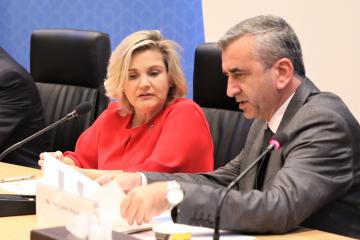
Beirut, 11 October 2019 (ESCWA)--The United Nations Library and Information Network for Knowledge Sharing (UN LINKS) is the United Nations system libraries’ platform to share know-how and best practices among UN librarians, and to engage in a dialogue with the local library community of the host country on issues of common interest.
On Monday 7 October, the ESCWA Library and UN LINKS, in cooperation with the Lebanese Library Association (LLA), organized a forum on the theme “UN Libraries, MENA Libraries, and Sustainable Development: Open Dialogue” at the UN House, in Beirut. Participants discussed innovation in information and knowledge management projects to support sustainable development, as well as solutions to libraries’ common challenges.
LLA Vice-President, Randa Al Chidiac, spoke of the importance of the forum as a platform to “talk about the Sustainable Development Goals (SDGs) further, as librarians,” affirming full LLA support to the implementation of the SDGs, be it through the preservation of knowledge or the dissemination of information.
The Forum took place back-to-back with the UN LINKS Meeting 2019, held from 8 to 10 October. After the adoption of the 2030 Agenda for Sustainable Development, libraries have increasingly been called upon to provide information on a variety of sustainable development themes. They need to ensure that such knowledge is easily accessible to all and that no one is left behind in their area of work as well. During the meeting, UN librarians discussed best practices on the subject.
Sharing his thoughts on the importance of access to information, Mr. Wouter Schallier, UN LINKS Chair, stated that 50 per cent of the global population does not have access to reliable information. “You would think that everybody has access to information in this digital world – well, this is not the case,” he said, adding that the work of libraries is vital in converting people from “digital consumers” to “digital citizens”. “This is what this whole meeting is about […] this exchange of experiences is very interesting,” concluded Schallier.
For more information:
-Ms Rania Harb, Public Information Assistant, +961-70-008-879; email: harb1@un.org





